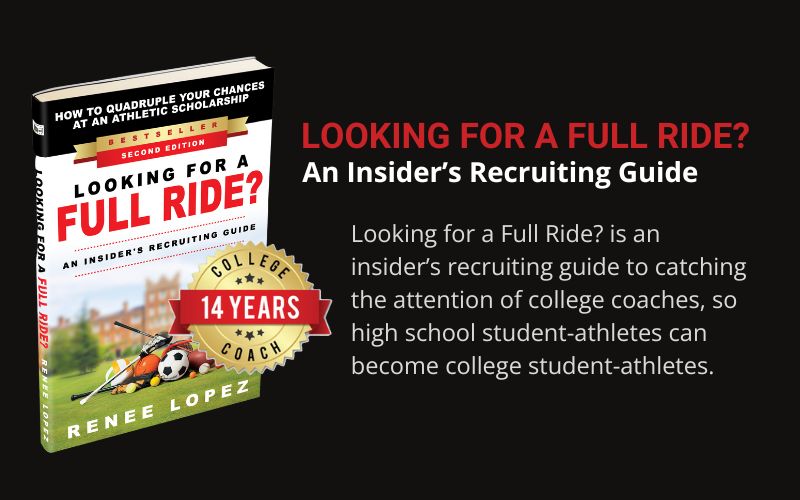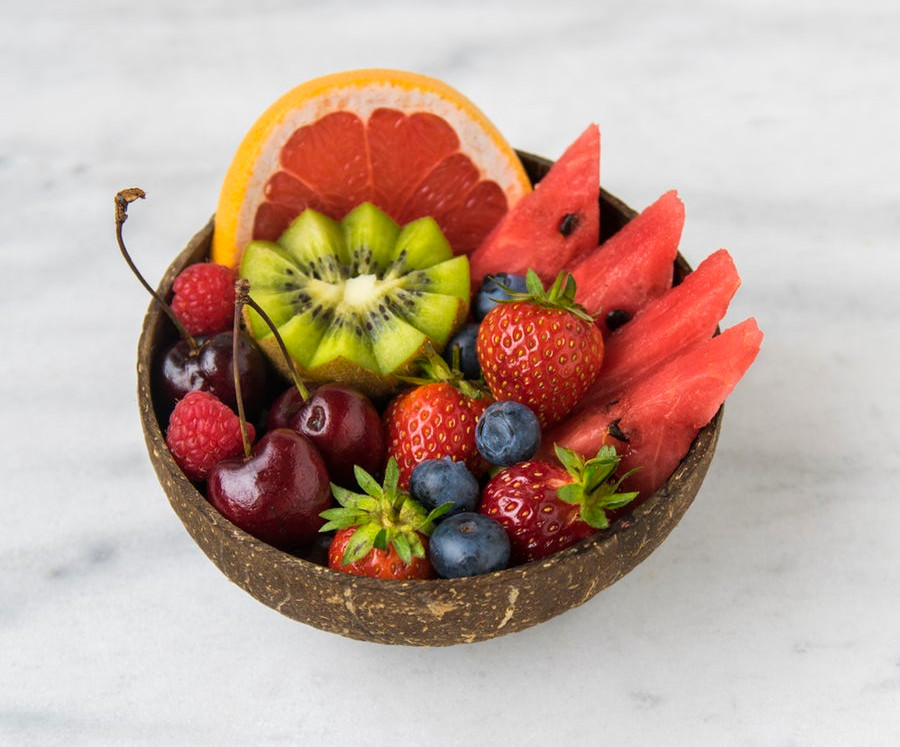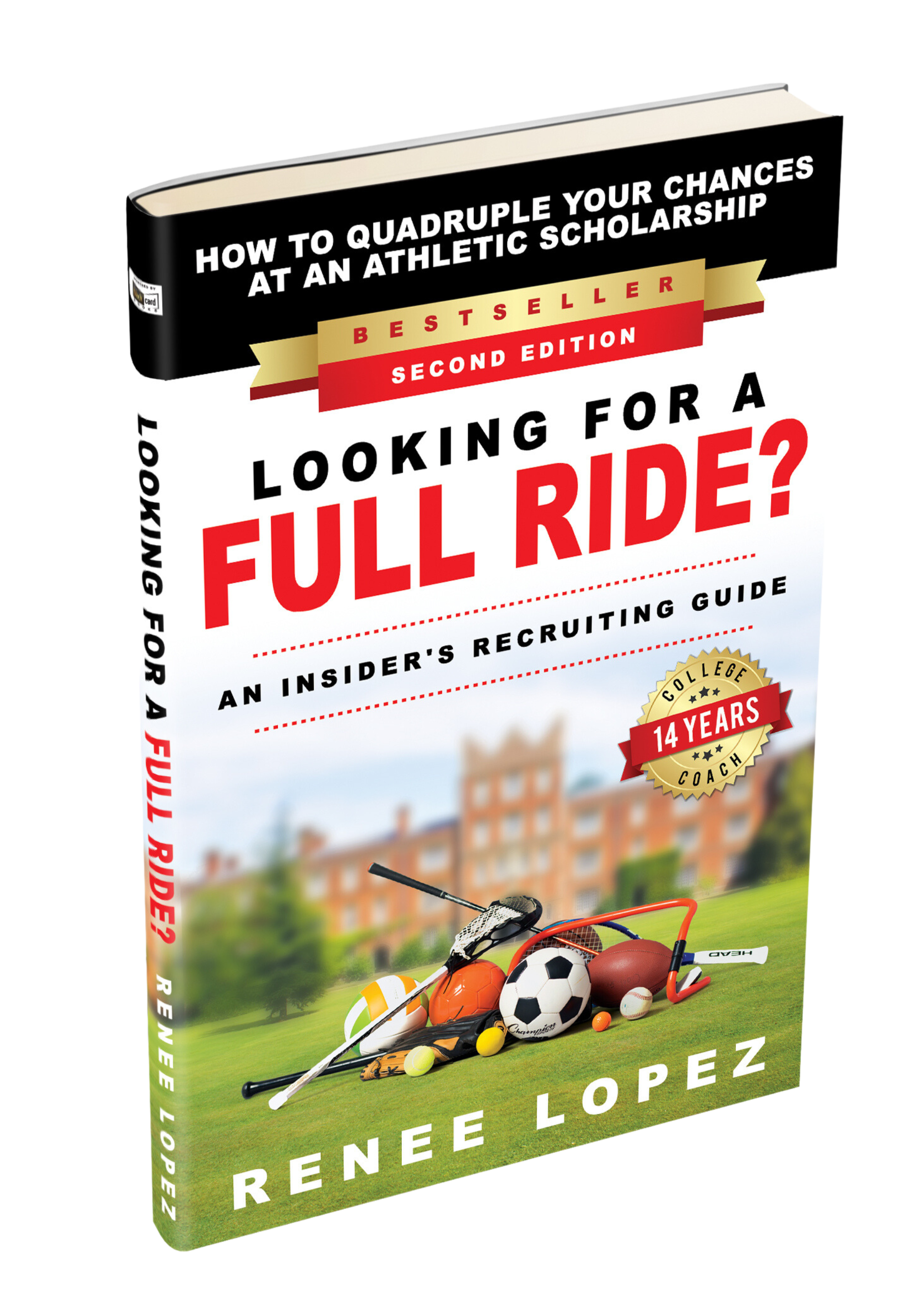3 Health Aspects that Impact the College Recruiting Process
Discipline. Dedicated. Committed.
During the college recruiting process, coaches are looking for students who are disciplined, dedicated, and committed to all aspects of being an elite athlete. They are obviously looking to offer athletic scholarships for those who are talented on the field, court, or in the pool. They also want athletes who are focused in their academics and behave away from the sports arena. It’s very important that they want to impact their community for the better.
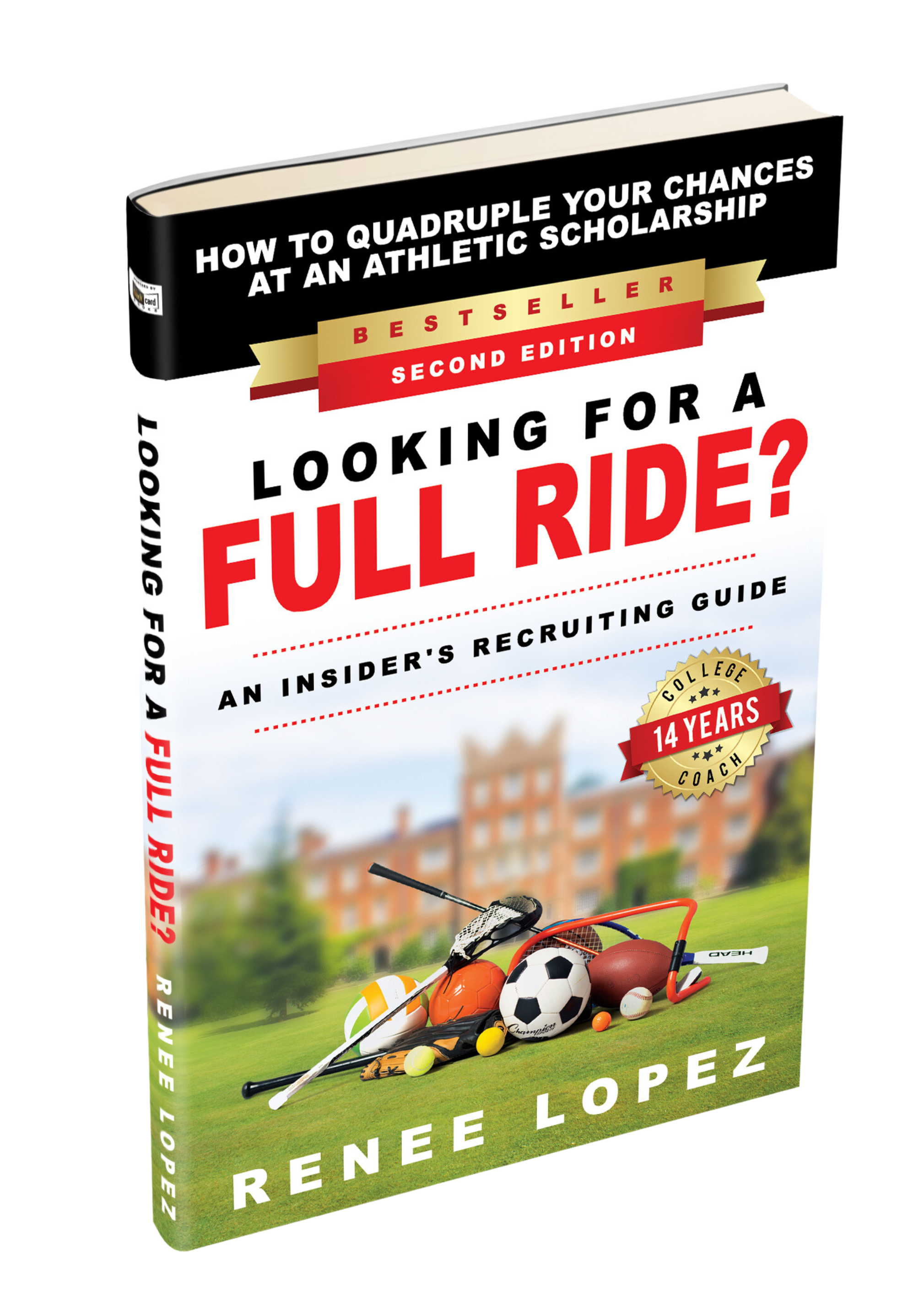 Having been a college coach for 14 years and interviewed 65 college coaches and athletic directors for my book, Looking For A FULL RIDE?: An Insider’s Recruiting Guide. I believe the daily disciplines of student-athletes can often lead to that elusive ‘competitive edge’. Those daily disciplines often include amount of sleep, recovery practices such as ice baths and stretching, and food intake.
Having been a college coach for 14 years and interviewed 65 college coaches and athletic directors for my book, Looking For A FULL RIDE?: An Insider’s Recruiting Guide. I believe the daily disciplines of student-athletes can often lead to that elusive ‘competitive edge’. Those daily disciplines often include amount of sleep, recovery practices such as ice baths and stretching, and food intake.
This week, I have asked Sports Dietitian Jackie Slomin to offer some advice to help student-athletes make the best decisions for performing at their best in regards to fueling their bodies.
 Coach Renee Lopez:
Coach Renee Lopez:
Thanks for joining us today, Jackie. Why do you NEED to be properly fueled during game day?
 Jackie Slomin:
Jackie Slomin:
Fueling before and after competitions is one of the most common questions I get as I work exclusively with high school athletes. I usually follow-up with my own question: “What do you think is more important: what you eat surrounding the day of the event OR what you eat every day leading up to your big game?”
The answer is most certainly the latter. Your day to day nutrition plays a much bigger role in your performance on game day then just ensuring you’re properly fueled the night before or day of an event. Nutrient deficiencies are common hurdles to performance and can affect your stamina, strength, energy levels and even mental focus. It is essential to have each of these components at 110% during a competition. Deficiencies don’t happen overnight and they also can’t be fixed as fast either.
The first thing to check before you even touch pre- and post-game fueling, is to make sure your day-to-day nutrition is on par. Student-athletes are at an extremely unique stage in their lives because not only are their calorie needs much higher because of how much energy they burn during training and games, but also because their bodies are likely still growing and have even MORE calorie and nutrient requirements to meet those needs. Ensuring adequate protein intake is important in order to help recovery and grow new muscles. Carbohydrates are also key to be able to train consistently at a higher intensity, as well as proper hydration.
Once your daily choices are on track (which will have the BIGGEST effect on performance), then you can start making a plan specifically for competition day which will offer athletes an even bigger competitive edge on the field, court, or in the pool. Sports nutrition is an extremely complex topic and should be tailored for individuals.
1. The Night Before Competition
Coach Renee:
What Should a Student-Athlete Be Eating the Night Before the Competition?
Jackie:
You want athletes to consume a meal high in complex carbohydrates with a moderate amount of protein and low-fat foods. The body’s main fuel source during intense activity (i.e. training or competitions) will be glycogen/glucose, which comes from carbohydrate sources. The night before competition, you want to choose complex carbohydrate options which will help our body store glycogen for the next day. Examples of complex carbohydrates include: whole wheat pasta or rice, bread, potatoes and quinoa.
Additionally, the meal should have a lean protein such as chicken, turkey, fish, or lean ground beef. Protein will be used minimally as a fuel source, but you still want to ensure you’re getting a balanced nutrient intake to meet our needs.
Coach Renee:
What Should They Avoid the Night Before the Competition?
Jackie:
Sports nutrition is pretty unique in that what you would think is ‘healthy’ and a good fueling option could actually be the opposite depending on when and how much of a particular food is eaten.
Fat is a necessary macro-nutrient that our bodies need to stay healthy, but too much can leave you feeling overly full, sluggish, and can even delay metabolism or cause under consumption of other key nutrients (carbohydrates).
Fiber containing foods such as beans, legumes, broccoli, cabbage etc. are nutrient power houses and in MOST situations are something you definitely want ample amounts of in your diets. However, during competition you need to limit fiber as these foods may cause gas, bloating, cramping and stomach upset.
Another mistake I see all too often is trying to make dietary changes as you are preparing for a competition. Do NOT try new foods before a competition. While there is plenty of sound research and science behind the complexities of sports nutrition, at the end of the day every single person reacts in a unique way to specific foods. While one person may be able to handle spicy or acidic food right before a competition, the next person may end up running to the bathroom in the middle of the game. Right before a game is not the time to be trying new recipes or spices.
Day of Competition
Coach Renee:
What About the Day of a Competition?
Jackie:
Your pre-competition meal can give you a competitive edge by helping to improve performance much in the same way your night before meal can, but with a few key differences:
Your pre-competition meal should still be high in carbohydrates with a moderate amount of protein and limited fat and fiber.
However, depending on how your game is after you eat, you may need to change it up a bit. If your game is 2-3 hours after your meal, then stick with complex carbohydrate sources such as whole grain breads, pasta, cereals and rice.
The closer your meal is to competition, the more simple carbohydrates you want in your diet. Complex carbohydrates take longer to break down and can sit heavy or cause stomach upset if eaten too soon before a game.
If your athlete has a particularly sensitive stomach, then this can also mean the difference between consuming liquid vs fuel to help with digestion.
Post-competition
Coach Renee:
I hear so many different suggestions regarding post-game, especially when an athlete is at away competition. What are your recommendations?
Jackie:
Post-competition meals are what are going to replenish our glycogen (energy) stores and ensure you’re providing the right nutrients to help your bodies and muscles recover efficiently. Studies have shown that the wrong types of food consumed after a game can SLOW recovery time by up to 40%!
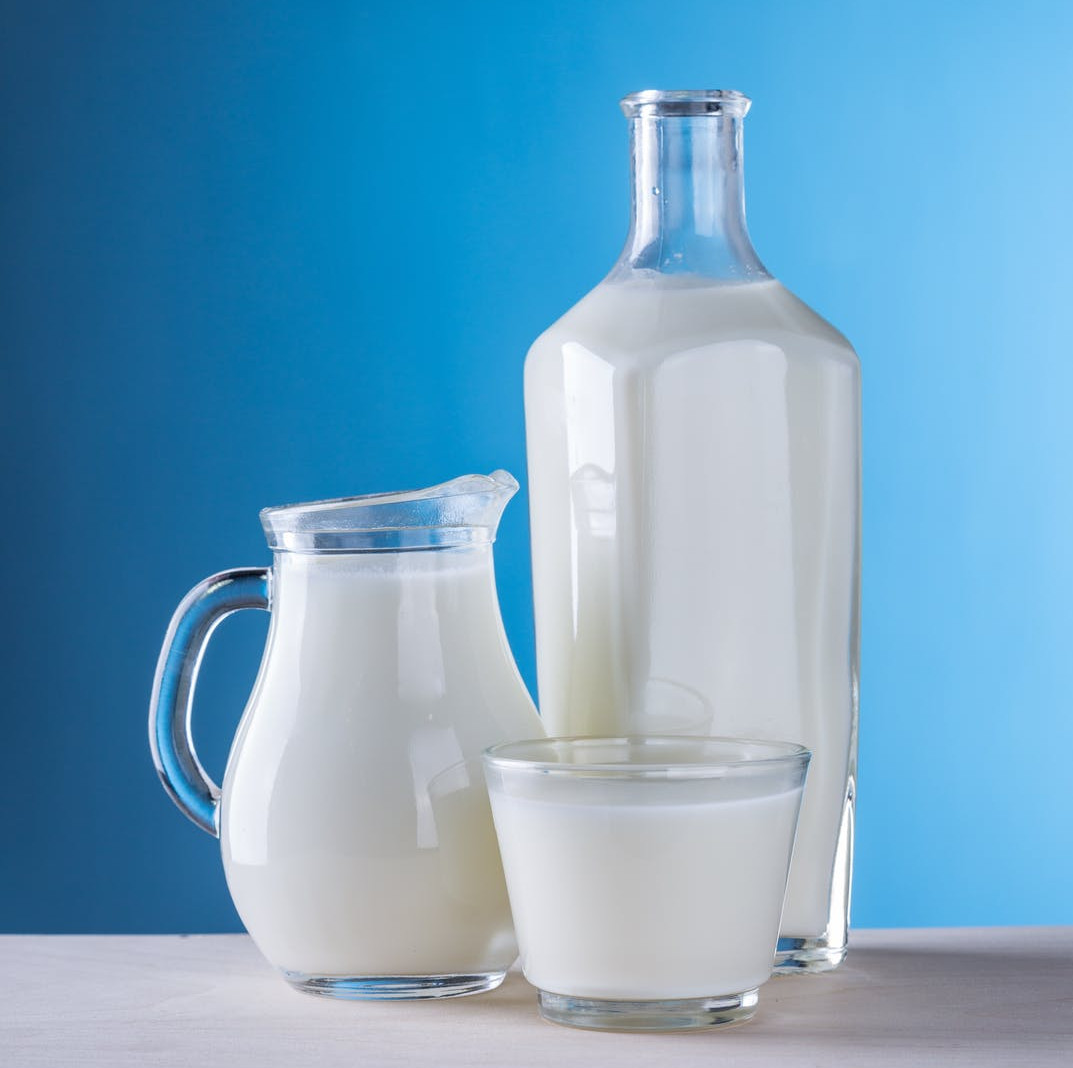 Timing of nutrients also plays a big role in how fast athletes can recover after intense exercise. For most athletes, eating a recovery meal within 30 minutes of competition or training is best practice as glycogen replenishes quick during this window of time. But there’s a lot of confusion around what exactly constitutes a recovery meal.
Timing of nutrients also plays a big role in how fast athletes can recover after intense exercise. For most athletes, eating a recovery meal within 30 minutes of competition or training is best practice as glycogen replenishes quick during this window of time. But there’s a lot of confusion around what exactly constitutes a recovery meal.
Much like pre-competition, carbohydrates are the star player here. Most youth athletes want to consume at LEAST 40g of carbohydrates and 10g of protein in their recovery meal or snack, but much like everything else, this is highly individualized based on the student-athletes age, gender, sport and training intensity. Common examples include 12 oz low-fat chocolate milk or 1/2 of a cold-cut sandwich with a piece of fruit.
Coach Renee:
This has been great information. What final recommendations would you offer?
Jackie:
The best athletes have a plan for fueling far in advance of their competition. As stated before, competition time is NOT when an athlete should be experimenting with what foods affect them. Additionally, every single athlete is different and is going to have different requirements for calories and nutrients– even if two players are on the same team or even play the same position, their nutrition plans are NOT going to look the same.
A well-prepared athlete can take all of this into account and have an individualized and tested plan way before game day, so that they have a competitive edge and are ready to perform their best when they walk on and off the field. Likewise, if you’re not utilizing proper sports nutrition then performance and recovery can be drastically lowered.
With so much misinformation and cookie cutter nutrition advice being given to student-athletes and their families, creating a sports nutrition plan can be very overwhelming. Even the most dedicated student-athletes could unknowingly be hurting their performance by consuming the wrong types of foods in the wrong amounts at the wrong time. Parents of student-athletes who have read this can use this link to schedule a FREE 45 minute clarity call in the next week with Jackie where we can discuss your student-athletes current performance and see if a sports nutrition program would help them get an edge on the competition.
Jackie Slomin
 Having previously worked with hundreds of NCAA Division I and II student-athletes from all different sports and having a graduate degree in sports nutrition and exercise science, Jackie Slomin is an expert at helping high school student-athletes discover how to improve their performance, energy, and recovery time by up to 50% with advanced sports nutrition principles that can be used by even the busiest of families. Jackie works with student-athletes, families, coaches, and teams to help them discover how to gain a competitive edge through nutrition. When Jackie isn’t working with athletes, she loves weight training, kayaking and trying new foods. You can contact her at info@jackieslomin.com and www.jackieslomin.com.
Having previously worked with hundreds of NCAA Division I and II student-athletes from all different sports and having a graduate degree in sports nutrition and exercise science, Jackie Slomin is an expert at helping high school student-athletes discover how to improve their performance, energy, and recovery time by up to 50% with advanced sports nutrition principles that can be used by even the busiest of families. Jackie works with student-athletes, families, coaches, and teams to help them discover how to gain a competitive edge through nutrition. When Jackie isn’t working with athletes, she loves weight training, kayaking and trying new foods. You can contact her at info@jackieslomin.com and www.jackieslomin.com.
Grab your FREE guide for building performance winning power snacks.
Want some help with the recruiting process? Join some of our 9 Facebook Groups:
- Parents of High School Student Athletes Walking Through The Process (All Sports)
- Beyond Xs & Os 4 HS Athletes: Health, Recruiting, Team Building, Mental Training (All Sports)
- Athletic Recruiting Education for Principals, AD's, and Counselors (All Sports)
- Club/HS Coaches Learning College Recruiting Process (All Sports)
- Play College Soccer (Soccer Specifically)
- College Recruiting for GK's (Soccer Specifically)
- Positive Team Building for Pro, College, HS, and Youth Coaches (All Sports)
- Mindset & Leadership Lessons for Athletes, Coaches/Teachers, & Business Leaders (All Sports & Business Leaders)
- Christian Competitors (Coaches & Athletes Serving Christ @Field/Court/Gym) (Sports Ministry for All)
Would you like her to do individual consulting with your family to get an insider’s perspective?
Email info@lookingforafullride.com for more details.
Did you know Coach Renee Lopez can come to your school or sports organization?
Email info@lookingforafullride.com for more details.
Coach Renee Lopez
As a 17 year coaching veteran, Coach Renee Lopez is a recruiting expert for high school student-athletes. She uses her NCAA Division I, II, and NAIA Head Coaching experience to help families navigate the recruiting process to be identified by college coaches and help them find the right “fit” for playing at the next level. She has produced 3 All-Americans, over 30 All-Conference athletes and Her teams have been honored with awards for team academic accomplishments, sportsmanship, and sports ministry. In addition, Coach Renee Lopez has been named Coach of the Year by her peers.
She presents recruiting seminars across the country, has recently been featured in USA Weekly, with the National Alliance for Youth Sports, on SiriusXM Radio and ESPN Radio. She is the author of the book, Looking For A FULL RIDE?: An Insider’s Recruiting Guide where she has interviewed over 65 college recruiters across all sports and college levels. In addition, she runs 9 Facebook groups to help facilitate conversations on college recruiting education, coaching education, leadership development, and sports ministry. She is also a certified speaker, trainer and coach for the John Maxwell Team, Jon Gordon Company, 3Dimensional Coaching, and the Positive Coaching Alliance.
She also does private consulting for student-athletes and their families to help in understanding the often daunting process of recruiting. (See one family’s testimonial.) If you are looking for help in the college recruiting process, please email Coach Renee Lopez at info@lookingforafullride.com.
